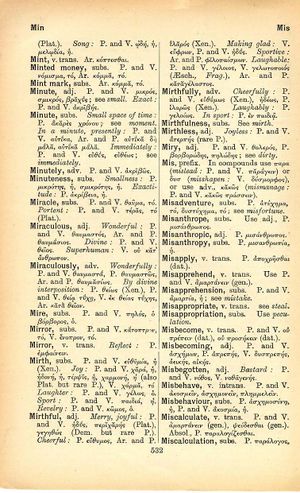mire: Difference between revisions
φέρουσα κατακρύπτει ἐς τὸ ἀφραστότατόν οἱ ἐφαίνετο εἶναι → wherefore she bore it away and hid it where she thought it would be hardest to find
(3) |
m (Text replacement - "(|thumb)\n(\|link=)" to "$1$2") |
||
| Line 1: | Line 1: | ||
{{Woodhouse1 | {{Woodhouse1 | ||
|Text=[[File:woodhouse_532.jpg|thumb | |Text=[[File:woodhouse_532.jpg|thumb|link={{filepath:woodhouse_532.jpg}}]]'''subs.''' | ||
|link={{filepath:woodhouse_532.jpg}}]]'''subs.''' | |||
P. and V. [[πηλός]], ὁ [[βόρβορος]], ὁ. | P. and V. [[πηλός]], ὁ [[βόρβορος]], ὁ. | ||
}} | }} | ||
Revision as of 17:36, 18 May 2020
English > Greek (Woodhouse)
subs.
P. and V. πηλός, ὁ βόρβορος, ὁ.
Latin > English (Lewis & Short)
mīrē: adv., v. mirus.
Latin > French (Gaffiot 2016)
mīrē¹¹ (mirus), étonnamment, prodigieusement : Cic. Br. 90 ; Att. 16, 11, 6 ; mire quam Cic. Att. 1, 11, 3, étonnamment ; v. quam.
Latin > German (Georges)
mīrē, Adv. (mirus), wunderbar, erstaunlich, außerordentlich, mire miserabilis, Cic.: m. finxit filium, Ter.: mire gaudere, Liv., favere, Cic.: mire gratum, Liv.: mire laetus, Curt. – mire quam (= θαυμαστῶς ὡς), es ist erstaunlich, wie; du glaubst nicht, wie, mire quam me illius loci non modo usus, sed etiam cogitatio delectat, Cic. ad Att. 1, 11, 3.
Latin > English
mire ADV :: uncommonly, marvelously; in an amazing manner; to a remarkable extent

